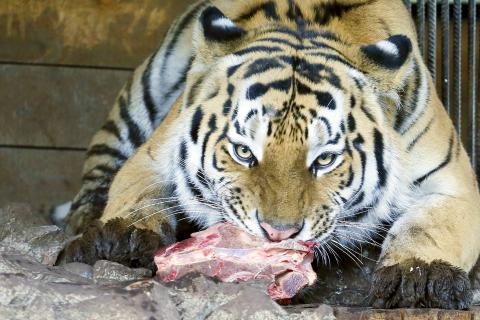Chinese practice
與虎謀皮
to ask a tiger for its skin

Photo: Reuters
照片:路透社
(yu2 hu3 mou2 pi2)
《太平御覽》是古代中國的第一部大型百科全書,於北宋時期編纂而成。其中的〈職官部〉記載了一個故事,裡面有「與狐謀其皮」這句話,意為向狐狸要牠的皮毛。
這故事是說,魯定公想要拔擢孔子,便向其史官諮詢意見,說他覺得應該要先徵詢掌握政治權力的三大宗族的同意。史官便告訴魯定公一個故事說,在周朝時,有一個人極愛動物毛皮與美食。他向狐狸要牠的毛皮,狐狸便跑進山裡去了﹔他又跟羊要牠的肉,羊就躲進森林裡去了。因此這個人從未得到毛皮大衣,也未嘗到珍饈。通情理的人若想促成某事,必須問對人。史官跟魯定公說,若想要拔擢孔子,不須徵詢同意,直接拔擢就對了。
此即為成語「與虎謀皮」的由來,原來的狐後來改成了虎,應為虎較為兇猛之故,且狐與虎兩字發音很相近。
「Like a turkey voting for Christmas」(像火雞投票贊成耶誕節)這片語的意義,像是希望造成對你自己最不利的情況。吃火雞是英國過耶誕節的習俗。由於耶誕節是每年都過,因此另一個類似但稍有點變化的片語是「like a turkey voting for an early Christmas」(像火雞投票贊成提前過耶誕節)。美國版的這個片語做了些改變,因為在美國,火雞通常是在過感恩節的時候吃的,所以變成「like a turkey voting for (an early) Thanksgiving」(是像火雞投票贊成(提前)過感恩節)。這種說法的起源比較晚近,最早這麼說的是英國政治家David Penhaligon,為了反對一九七七年英國自由黨和工黨之間的協定。他說「Us voting for the Pact is like a turkey voting for Christmas」(若我們投票通過這個協定就像是火雞投票贊成過耶誕節)。英國前首相James Callaghan一九七九年的一場演講中引用了這個比喻,說道:「有人告訴我最近在國會流傳一個笑話,說這是史上頭一遭火雞投票通過了要提早過耶誕節。」
(台北時報編譯林俐凱譯)
在集權專制國家中想要進行民主改革,往往是與虎謀皮,沒有好下場。
(Attempting to undertake democratic reforms in a totalitarian state with centralized power is not a good idea, and has never ended well.)
英文練習
like a turkey voting for Christmas
The Taiping Yulan, or Imperial Overview from the Taiping Era, is the first large encyclopedia of ancient China, and dates to the Northern Song dynasty. In the section entitled the Zhiguan State Offices appears a story with the phrase 與狐謀其皮,meaning “to ask foxes for their pelts.”
Apparently, Duke Ding of Lu wanted to promote Confucius. He asked his Grand Scribe for advice, saying he felt he should first ask permission of the three powerful clans who, between them, dominated political power within the state. His scribe related the following story:
During the Zhou dynasty there was a man who loved fur coats and good food. When he asked foxes for their pelts, they ran into the hills; when he asked lambs for their meat, they hid in the forests. He never got his coats; he never had his feast. The moral being, if you want something to happen, know whom to ask. Don’t, said the scribe, seek permission to promote Confucius. Just do it.
This is thought to be the origin of the idiom 與虎謀皮, with fox, hu, changed to tiger, hu, (which sounds very similar in Chinese) presumably because “tiger” gave the metaphor more power.
The phrase “like a turkey voting for Christmas” has a similar meaning of wishing to bring about circumstances that are most certainly not in your own interests. Turkeys, of course, are commonly eaten for Christmas dinner in the UK. Another slight variation of the phrase, as Christmas happens without fail every year, is “like a turkey voting for an early Christmas.“ Certain adjustments to the phrase are called for in the US context, where turkeys are more commonly eaten for Thanksgiving: thus, “like a turkey voting for (an early) Thanksgiving.”
This saying is of relatively recent provenance. The first usage of it was apparently by the British politician David Penhaligon, who opposed the 1977 pact between the Liberal and Labour parties. He has been quoted as saying, “Us voting for the Pact is like a turkey voting for Christmas.” In a speech in 1979, then UK prime minister James Callaghan made reference to the simile, saying, “I am told that the current joke going around the House is that it is the first time in recorded history that turkeys have been known to vote for an early Christmas.”
(Paul Cooper, Taipei Times)
Many people feel that the British people voting for Brexit will ultimately be bad for the country, and that it was like a turkey voting for Christmas.
(很多人覺得英國人投票決定脫歐,最終將對英國不利,就像是自取滅亡一樣。)
Are you sure you want to agree to those terms? Talk about turkeys voting for Christmas…
(你確定要同意那些條款嗎? 這感覺就像是與虎謀皮。)

A: Apart from megahit “KPop Demon Hunters,” what else is worth watching? B: The new shows featuring four top-tier actors – Xiao Zhan, Wang Yibo, Yang Yang and Li Xian — are all popular. A: Yang’s TV drama, “The Immortal Ascension,” is definitely one of the summer sizzlers. Some praise it as the Eastern edition of the glorious “Harry Potter” series. B: Yeah, the costume fantasy drama is about a young man’s journey to immortality. All the magic powers and magical tools in the show are just stunning. A: Let me go stream it now. I wanna

Rarely does Nature present such a striking contradiction as the one found in Lencois Maranhenses National Park. Located along Brazil’s northeastern coast, the park unveils breathtaking scenery, where rippling sands meet crystal-clear lagoons. Under the sun’s golden glow, the waters glitter in shades of turquoise and emerald. So surreal is this spectacle that visitors might wonder if they’re gazing at a digitally modified photo rather than a living landscape. Were it not for the unique geographical and climatic conditions, such a marvel would not exist. Unlike typical deserts, Lencois Maranhenses receives a substantial amount of rainfall, particularly during the rainy season

China commemorated 80 years since the end of World War II last week with a massive military parade against a backdrop of a disputed history about who ultimately defeated Japan. The issues, including Japan’s reckoning with its wartime record in China, are bound to flare again in December, a flashpoint anniversary of the mass killing in Nanjing by invading Japanese troops. Below is an explainer about what the different — and disputed — points of view are. WHAT IS CHINA’S VIEW? For the Chinese government sitting in Beijing, this is a clear-cut issue: China sacrificed 35 million people in a heroic and brutal struggle

A: Wow, animated fantasy film “KPop Demon Hunters” (KDH) has become Netflix’s most viewed film ever. B: Isn’t that the movie about a K-pop girl group secretly serving as demon hunters? A: Yeah, and its theme song “Golden” was No. 1 on the Billboard chart. B: The hit performed by HUNTR/X — the girl group from KDH — has inspired a “Golden challenge,” as celebrities are racing to cover its sky-high notes. A: Cool, let’s try it out. A: 哇,動畫電影《KPop獵魔女團》近日已成為網飛上觀看次數最多的電影。 B: 這部電影不是關於某韓流女團,成員秘密擔任惡魔獵人的故事? A: 對,主題曲《Golden》更勇奪告示牌單曲榜冠軍呢! B: 該曲由電影中的女團「HUNTR/X」所演唱,甚至還掀起一股全球《Golden》大挑戰︰一堆名人挑戰翻唱該曲飆高音。 A: 酷喔我們也來挑戰吧。(By Eddy Chang, Taipei Times/台北時報張迪)